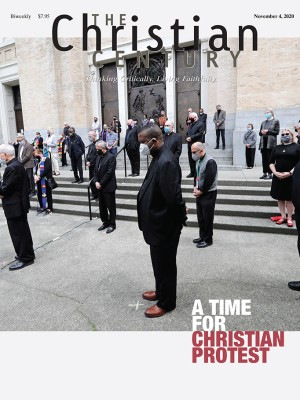Faith groups distribute USDA food boxes, despite Trump’s intrusion

Millions of boxes of USDA surplus food are being shipped with mandated letters from President Donald Trump asserting his concern to protect the well-being of Americans struggling through the coronavirus pandemic.
That this unprecedented action is taking place just before the November election is a fact critics decry as a cheap politicization of food and hunger.
Yet faith-based and secular food providers say they are distributing the boxes anyway—because hungry people need food.
“I don’t like the fact there are letters in there with his name on [them], but it’s not going to stop me from delivering that food,” said Jason Coker, national director of Together for Hope, the Rural Development Coalition of the Cooperative Baptist Fellowship.
The $4 billion Coronavirus Food Assistance Program—also known as Farmers to Family Food Boxes—was launched in April in response to huge food scarcity increases created by the pandemic. Since then, 102 million boxes have been distributed, according to the USDA.
Read our latest issue or browse back issues.
The boxes include fresh meat, dairy, produce, and—in the weeks leading up to the election—a letter from Trump, in English and Spanish, claiming his direct involvement in making the program happen.
“Over the last four weeks, we have delivered 50 million [boxes] to American families, and we will continue to serve those most in need during this challenging time,” the letter states.
The letter’s presence is a challenge to some of those who distribute the boxes, said Robin Safley, executive director of Feeding Florida, the state’s food bank network and a Feeding America member organization.
“We have already gotten some feedback from people who were offended by the letter and pushed back on the food bank because they don’t know the intricacies of how the box works,” she said. “We are serving thousands and thousands of individuals, and the letter is a requirement.”
In fact, the boxes arrive at food pantries with the letter already inside. “Even if you could remove it, it would be highly labor intensive and raise food safety issues,” she said.
Several food banks in Florida have responded by adding their own letters to the boxes or using social media to distance themselves from the Trump letter. “There is a lot of nervousness about the letter,” she said. But none of the food banks in Safley’s network have decided against distributing the boxes.
“As a network, there is some angst about it, but nobody in Florida thought they could reject the food, because hunger and the needs of people come before that.”
Still, the concern about politicizing food and hunger remains strong, Safley said. “Food and hunger should be nonpartisan.”
Such problems come with the territory when cooperating with the government in distributing food to those in need.
“Yes, the recent food boxes Three Square received from the USDA did contain the letter from President Trump inside,” said Brian Burton, president and CEO of Three Square Food Bank in Las Vegas, Nevada. “The nonprofit appreciates the support of Congress and the White House. And, while Three Square believes that hunger is a nonpartisan issue, solutions to fight hunger require collaboration. These points are mentioned in a supplemental letter that Three Square penned to be included with the boxes as well.”
Coker said the presence of a presidential letter in the food boxes would be easier to swallow if it were from a president who had demonstrated sympathy or concern for the working poor of America.
However, “the bottom line is people are getting food.”
He added that there are systemic factors around hunger that deserve more attention.
“Why is it so bad in America that we have to do that much charity work? What is wrong with our system that we have to be in the food business at all? If we’re as great as we think we are as a country, why are so many people food insecure?” Coker asked. “The answer is that the policies we create in this country aren’t broken—they’re designed to work this way.” —Baptist News Global




